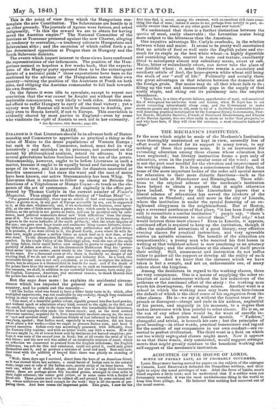THE MECHANIC'S INSTITUTION.
Jr the uses which might be made of the Mechanic's Institution were thoroughly understood or kept in view, assuredly less of effort would be needed for its support in many towns, to say nothing of those that possess none. It is an instrument for extending education among those classes whose education has been neglected ; but literary instruction forms a part only of education, even in the purely secular sense of the word ; and it is not the part most needful for the elevation and improvement of the working classes. It is from a consciousness of that fact, that some of the more important bodies of the order add special means for relaxation to their more didactic functions—such as the soirees and balls at Manchester and Birmingham. These addi- tions to the original scheme of the mechanic's institution have helped to obtain a support that it might otherwise have lacked. We see by the Lincolnshire papers that a liberal scheme of relaxations has served the interests of the institution at Sleaford ; and still more in the city of Lincoln, where the institution is under the special fostering of an en- lightened clergyman in the neighbourhood. But at Boston, says a reverend gentleman of that place, "it has been found diffi- cult to resuscitate a similar institution ": people say, " there 's nothing in the movement to interest them." Now why? what would interest these inert classes ? Even in Lincoln, it appears, continued effort is required to keep up the institution, though it offers the undoubted attractions of a good library, very effective evening classes for practical instruction, and very agreeable soirees on suitable occasion. The benefits of the education are unquestionable ; a young man who received his first lesson in writing at that volunteer school is now practising as an attorney in Cambridge ; and the attendance at the classes of itself proves their utility. Still, amusement and instruction do not suffice either to gather all the support or develop all the utility of such institutions_ And we know that the instance which we have taken is but a sample, and not an unfavourable one, of many others about the kingdom.
Among the desiderata in regard to the working classes, three are very conspicuous. One is a means of supplying the sober re- laxation of social intercourse without the low seductions of the pothouse or the continued effort of the study : the working man wants his drawingroom, for evening solace. Another want is a school in which the working man may learn those bienseances the default of which is the chief cause of his segregation from the other classes. He is—we say it without the faintest trace of re- proach or disrespect—abrupt and rude in his address, neglectful of his person, and ungainly in his manners, to a degree that makes intercourse with him painful to other classes. He is so, as the son of any other class would be, for want of specific in-
struction on such points and familiar models. " Fashion," changeful and trivial, is beneath his care ; but the principles of good breeding—in other words, practical benevolence and regard for the comfort of our companions in our own conduct—are es- sential to perfect civilization. The third want is a field on which our too widely segregated classes might meet. Now it appears to us that these wants, duly considered, would suggest arrange- ments that might greatly conduce to the beneficial working and self-support of the mechanic's institution.


























 Previous page
Previous page